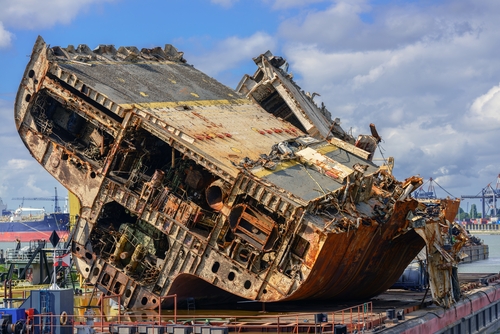The EU rules on ship recycling aim to make the process greener and safer. However, there are a lot of cases where the regulations are not followed by the book, one such case is the SeaTrade which demonstrated the critical element of the ‘last voyage’ of ships from EU ports as this will play a pivotal role regarding the application of the EU regulations.
What happened
It was back in March 2018 when the District Court in Rotterdam penalized the Dutch shipowner Seatrade for breaching the European Waste Shipment Regulation (No 1013/2006) (the “WSR”).
To remind, the European Waste Shipment Regulation (EU-WSR):
- Adopted in 2006 and entered into force in July 2007 (EC Regulation No. 1013/2006)
- Implements Basel Convention and Ban Amendment requirements at EU level
- Prohibits export of hazardous waste for disposal to non-EU or non-OECD countries
- Prohibits import of hazardous waste for disposal from non-EU or non-OECD countries
In 2012, Seatrade sent four reefers from the EU ports of Hamburg and Rotterdam for scrapping in India, Bangladesh, and Turkey. Proceedings were commenced by the Dutch Public Prosecutor for breach of the EU waste export laws prohibiting the shipment of ‘hazardous waste’ from EU ports to non-OECD countries.
In light of the situation, Seatrade argued that the ships were not considered as waste because when they sailed from the EU ports, they were seaworthy and operational, and indeed, three of them had cargo on board.
However, an email evidence revealed that negotiations were held as to the fleet’s scrap value before the voyages from Hamburg and Rotterdam contributed inter alia to the court’s conclusion that the shipowners’ intention was to scrap the ships.
Keeping in mind the adverse effects that scrapping (especially in the South Asian yards) can cause to the environment and human health and safety, the court found that the executives of Seatrade had “closed their eyes” to the problem and only considered the business interests.
As a result, the court found two executives guilty, suspending them from work for 12 months and fining them heavily for an amount representing the profit made from selling the reefers to scrapyards in non-OECD countries in breach of the existing EU regulations.
According to Standard Club:
The Seatrade shows the critical element of the ‘last voyage’ of ships from EU ports as this will play a pivotal role regarding the application of the EU regulations. It may also be equally important where and when a ship changes its flag before travelling to a recycling yard.
Overall, in 2020, the shipowners succeeded in their appeal and the case has now been sent back to the lower court for retrial due to court impartiality concerns. In any event, the Seatrade is an important decision as it is the first prosecution under the EU rules and has opened the door to further prosecutions.
Lessons learned:
When a member informs a club that it intends to scrap a vessel, the managers then need to:
- obtain details of the final voyage, the destination of the scrapping and at what point in the process the legal title of the ship will transfer to the ‘buyer’.
- seek confirmation that all relevant regulations, conventions, and local licences/permissions for scrapping have been complied with/obtained.
Taking into consideration the SeaTrade case, operators and shipowners intending to send any ships for recycling are recommended to:
- Be vigilant not to conceal/mis declare the ship’s destination when leaving EU waters for recycling, as regulators may review the list of ships arriving in Asian scrapyards to assess whether there has been a breach/failure to comply with the EU regulations.
- Be aware that their decision-making process prior to recycling may be reviewed in order to assess the shipowner’s true intention and whether the purpose of changing a flag state registration was to evade EU regulations.
- Ensure full compliance with the international standards – the HKC or EU-SRR, Basel Convention, Basel Ban Amendment, EU-WSR and other applicable regulations.
- Exercise due diligence by selecting a yard that has a Statement of Compliance (SoC) with the HKC or EU-SRR, and by preparing the ship for recycling in a sustainable way through mapping hazardous materials. When selling a ship to a third party, a high degree of vigilance is required too.
After confirming that all relevant regulations have been complied with, the club needs to be provided with details of the final voyage, the ship’s flag, the location of the recycling and at what point in the process title will transfer to the ‘buyer’.
…Standard club concluded.






























































